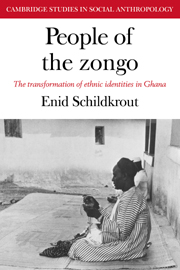Book contents
- Frontmatter
- Contents
- List of tables, figures, and maps
- Preface
- Glossary
- I Ethnicity and migration
- II Kinship and community
- III Politics and change
- 8 The political history of the zongo community: 1900–1970
- 9 The social organization of the Mossi community
- 10 Ethnicity, generational cleavages, and the political process
- 11 Conclusion: ethnicity, cultural integration, and social stratification
- Notes
- Bibliography
- Index
9 - The social organization of the Mossi community
Published online by Cambridge University Press: 29 October 2009
- Frontmatter
- Contents
- List of tables, figures, and maps
- Preface
- Glossary
- I Ethnicity and migration
- II Kinship and community
- III Politics and change
- 8 The political history of the zongo community: 1900–1970
- 9 The social organization of the Mossi community
- 10 Ethnicity, generational cleavages, and the political process
- 11 Conclusion: ethnicity, cultural integration, and social stratification
- Notes
- Bibliography
- Index
Summary
From the point of view of outsiders - government officials or members of other ethnic groups - the Mossi often appear to be a corporate unit represented by their headman and other leaders and capable of acting as a political faction in alliance with, or in opposition to, other ethnic groups. However, when the internal organization of the Mossi community is studied, differences in values and social organization between generations are such that it is difficult to describe simultaneously the communities of Mossi migrants and Mossi 'yan k'asa. This has been shown in the discussion of kinship, where most statements apply to first-generation immigrants or to 'yan k'asa, rarely to both. Here, the internal political structure of the community is described, and these variations again must be considered.
The Mossi community
The use of the phrase, the Mossi community, presents problems when one looks at the question of participation. Mossi live all over Kumasi, as Table 5 suggests. The main headman of the Mossi community has always lived in the Zongo. That is, there have been four headmen, and these have always lived in the same area of Zongo Extension. Meetings of most of the main Mossi associations take place in the Zongo, sometimes in the mosque known as the Mossi mosque, which was built by the former headman. The present and past headmen have held informal courts in this neighborhood.
- Type
- Chapter
- Information
- People of the ZongoThe Transformation of Ethnic Identities in Ghana, pp. 221 - 251Publisher: Cambridge University PressPrint publication year: 1978



